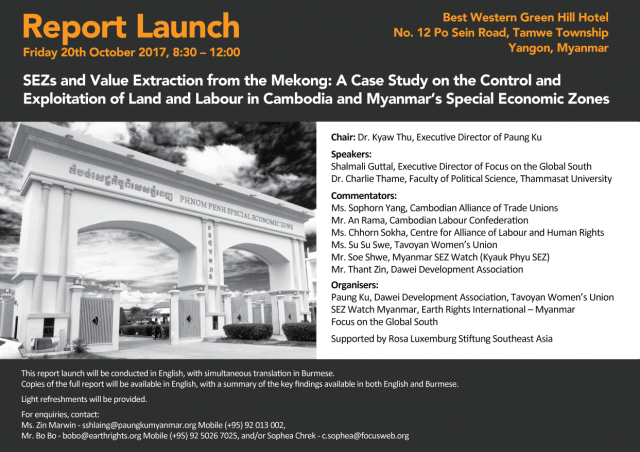Read other papers presented >>>
See Photographs from the conference>>
Shalmali
Guttal, Focus on the Global South, July 15, 2007
Good morning everyone. On behalf of
several organisations and networks, I would like to welcome you all
to the conference, Understanding Global Finance-Building
International Resistance. This conference is a joint effort by The
Bretton Woods Project, Eurodad, Fifty Years is Enough, Gender Action,
IDEAS Network, Jubilee South-Asia Pacific Network on Debt and
Development, Solidarity Africa and Focus on the Global South.
The idea of organising such a
conference dates back to April 2006, when many of us met with other
organisations and movements in Washington DC to discuss what it would
take to dismantle the International Monetary Fund (IMF). Inspired by
the success of the the international movement–which many of us are a
part of–to resist the trade liberalisation regime presided over by
the World Trade Organisation (WTO), we wondered if it is indeed
possible to build a similar movement against the IMF. And borrowing
from the anti-WTO movement, we formulated a campaign document titled:
IMF-Shrink or Sink. This and other documents are included in the
CD in your folders.
It took almost a decade to build the international movement to jam the gears of the WTO. Its presence became visible to the world in the protests against the Ministerial Meeting in Seattle in 1999; the Ministerial meeting collapsed and the movement had an early taste of victory. Since then, the movement has moved on to more victories, some defeats and many challenges. At present, the WTO is in a state of crisis as trade negotiators try to cobble together some semblance of an agreement, not to move trade liberalisation forward, but to save face. This is a big victory for the movement. The grandest aspect of the victory, though, is the manner and speed by which the movement against the WTO grew and expanded; how it internationalised local and national struggles against the destructive impacts of unchecked trade liberalisation, and how brought into its ranks a wide array of constituencies: peoples' movements, farmers' organisations, public and private sector unions, civil society organisations, the women's movement, academics, researchers and experts in high profile think tanks, national and sub-national legislators, parliamentarians, congressional representatives, businesses, entrepreneurs and even faith based organisations.
Over the past 18 months we have wondered whether it is possible to build a similar movement against the IMF.
The IMF, like other global actors, does not act in isolation. After all, it was set up by governments more than 60 years ago in 1944, in the town of Bretton Woods in New Hampshire, USA. The IMF is backed by the seven most industrialised nations of the world-the G-7. It has 185 countries as its members, both rich and poor and include emerging economic powers such as China and India. It works in tandem with other International Financial Institutions (IFIs) and groupings such as the World Bank, regional development banks, the Bank of International Settlements, the Financial Stability Forum, and private banks and financiers.
Since its inception, the IMF was given the responsibility of: 1) ensuring the stability of the international monetary and financial system; 2) promoting financial stability and preventing financial crises; 3) helping to resolve financial crises when they do occur and, 4) promoting economic growth and alleviating poverty. However, the IMF has not been able to discharge any of these responsibilities successfully.
Ten years ago in this very month, a financial crisis erupted in Thailand, swept rapidly across Southeast Asia and collapsed most of the miracle economies of the region. The cause of the crisis was fluid finance which, unfettered by national regulation, flew in and out of East Asia's economies rendering them vulnerable to speculative attacks and manipulation. While the financial crisis bankrupted several nations in the short term, the IMF's so called "rescue packages" — which were supposed to pull crisis struck nations back on their feet – had more devastating and longer lasting effects and deepened poverty across the entire Southeast Asia region. Financial policy pundits blamed "crony capitalism" for the financial and economic crises. But similar crises erupted in other countries as well (such as Turkey and Argentina) and in every one of them, the IMF's "rescue packages" had the same devastating effects. In the meantime, Russia was already reeling under the severe shock therapy of an IMF designed structural adjustment programme.
Structural adjustment programmes (SAPs) are not new to most of us. SAPs were imposed on countries in Latin America, Africa and Asia to ostensibly address balance of payments and debt crises. But to date, no country under a SAP has actually come out better for it. Most countries that have undergone years of SAPs remain heavily indebted, and poverty, unemployment and social insecurity have become entrenched conditions in all countries that have followed IMF and World Bank policy prescriptions to the letter. Even countries that have managed to graduate from SAPs have lost.significant portions of their public services to privatisation.
The past several decades of performance show that the IMF has failed in all three of the main functions it ascribes to itself: surveillance, technical assistance and lending. And what is most obvious about the failures of the IMF and other institutions of global financial governance is their failure to regulate and control private finance. The continuing vulnerability of nations to financial upheavals caused by currency speculation, capital inflows and outflows, and exchange rate manipulations reveal the havoc that can be created by the vagaries of unregulated finance and policy regimes that demand indiscriminate financial and economic liberalisation, financial deregulation and over-dependence on external markets to meet national development priorities.
Finance, and increasingly private finance, is at the heart of the global capitalist economic system. The dominant characteristics of what we refer to as economic globalisation are the unrestrained power of finance and capital flows, the expansion and explosion of financial markets, the increasing sophistication and complexity of financial instruments, and the growing disconnect between the real economy and financial markets.
Today, private finance is more powerful than ever before with hedge funds, investment banks, commercial banks, pension funds and private equity developing numerous and complex ties with one another. Speculative instruments such as derivatives have burgeoned, financial markets and instruments have become more sophisticated and complex, and future threats of currency destabilisation and financial instability continue to loom. Privatisation, trade and investment liberalisation, development finance and interest rates are all driven by the interests of financial markets.
Every aspect of our lives, economies, societies and environments is becoming financialised: global warming, social security, food security, employment, retirement options, even risks and uncertainties have become opportunities for profit extraction. The world of finance and capital flows-public and private-is large and complex and also abstract to many of us. But its operations have direct impacts on national economic policies, development strategies, and the abilities of people and communities to live decent, secure lives and in many cases, even just to survive.
Financial markets and investors define the limits of national autonomy in economic policy and a country's economic "health" is judged by stock market indices, private capital flows and the extent to which the country is a favoured destination for private investment. Increasingly, countries are measuring their economic success in terms of their abilities to attract, facilitate and/or provide financial services. I have here the Financial Times from July 6 in which an article titled "Asia seeks its centre." describes how Asian cities are fiercely competing with each other to to build the "pre-eminent financial centre to rival London and New York."
At the same time, governments, academics, researchers, peoples' movements and other civil society actors are attempting to come up with proposals to regulate and control capital and create alternative financial structures. The main purpose of this conference is to bring some of these people together to:
*
Deepen understanding among participants about the byzantine world of finance and capital;
*
Examine the crises of competence and legitimacy of institutions of global financial governance, including private financial institutions and especially the IFIs;
*
Discuss proposals for regulating finance and capital flows by governments, peoples' movements and other civil society actors;
*
Explore the possibilities of building collective strategies to challenge the power of unregulated finance and capital flows and to promote alternative approaches to the economy, finance, development and well-being at various levels;
We are extremely fortunate that we have several well known academics and researchers (who are also activists) from various organisations and networks here to share their analyses with us and help us to add to our store of information and knowledge. The programme is flexible and we have tried to design it to take advantage of peoples' schedules–since some will need to leave soon. Day one will be devoted to getting an overall picture of global finance, Day two will be spent on discussing alternatives, and on Day three we will try to come up with collective strategies.
All of you participating in the conference have knowledge and experience in your fields and locations of work that are important for building collective endeavours. We want everyone to be able to have the opportunities to contribute and learn, and for this reason we have kept space for lots of break-out groups which can be arranged to suit our collective interests.
Once again, I welcome you here at this conference and look forward to three days of exciting discussions and future collaborations towards resisting the power of global finance.








